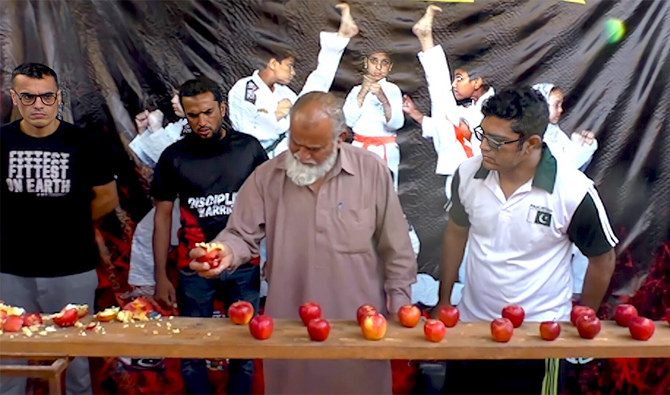KARACHI: Naseem Uddin, an iron-fisted 70-year-old Pakistani welder who has made a Guinness World Record for most apples crushed in the hand in one minute, says he now aims to break any record held by his country’s archrival, India.
Naseem Uddin was listed in the Guinness Book of World Records earlier this month, replacing Donnie Baxter from England, who had crushed 13 apples: “The most apples crushed in the hand in one minute is 18 and was achieved by Naseem Uddin (Pakistan), in Karachi, Sind, Pakistan, on 13 November 2021,” the entry reads.
The record was achieved at his son’s martial arts academy in Pakistan in celebration of Guinness World Records Day 2021.
“It has been seventy years, (but) my heart is young, my hand has the power,” Naseem Uddin told Arab News at his welding shop in Karachi. “Now, I wish to break any Indian record.”
Naseem Uddin became a welder after leaving his village near Punjab’s Faisalabad city in search for a better livelihood in Karachi some six decades ago.
“I have been doing hard work since the day I left my village,” he said. “I have been doing this [welding] from dawn till dusk, and till midnight.”
His journey to become a world record holder was inspired by his son and granddaughter, both of whom also hold Guinness records. It was his son, Muhammad Rashid, who showed Naseem Uddin a video of the previous record holder crushing apples with a hand and taught his father how to do the same.
“And then I crushed it, I broke it as he gave it to me,” Naseem Uddin said.
Rashid was sure his father could break the world record.
“This record was all about strength of hands and I have seen my father working a difficult job with hands, working with iron, molding it and I had belief that he would do it,” he told Arab News. “My father has set an example and told people that age is just a number. The man who has been my inspiration throughout my life has achieved something and I cannot express my happiness in words.”
Rashid, a martial arts school owner in Karachi, has himself won dozens of world records and the titles of “Bruce Lee of Pakistan” and “serial record breaker.” His achievements include most walnuts crushed by the hand in one minute, most watermelons crushed with the head in 30 seconds, most soda cans crushed with the elbow in one minute, and most spins of a fire staff in one minute.
As well as just using his fists and elbows as smashing instruments, he also holds many records using nunchaku and a Bo staff – both traditional martial arts weapons, according to the Guinness Book of World Records.
“His record-breaking journey began in 2013, when he broke the record for the most bottle caps removed with the head in one minute (40) at the Punjab Youth Sports Festival, in Lahore, Punjab, Pakistan,” the Records website says. “A year later, he went on Italian television show Lo Show Dei Record to break his own record, achieving 61.”
Seven years later, Rashid’s record-breaking appetite has only grown.
He broke 14 records in 2020, including the fastest time to unscrew 10 bottle caps with a nunchaku, achieving a time of 17.82 seconds.
Rashid has also trained his daughter, Fatima Naseem, who broke the record for the most full contact elbow strikes in one minute using alternate elbows (female) with an incredible 242 on 16 August 2020, dethroning Indian martial artist Kiran Uniyal.
Naseem Uddin beamed with pride as he spoke of his son and granddaughter’s success, saying he was glad he could join their ranks as a record holder himself.
“This is what we could do for Pakistan,” he said, pointing to his country’s flag on the wall of his workshop. “Now, I did it and it has evidently become my identity and I am much happier.”


















